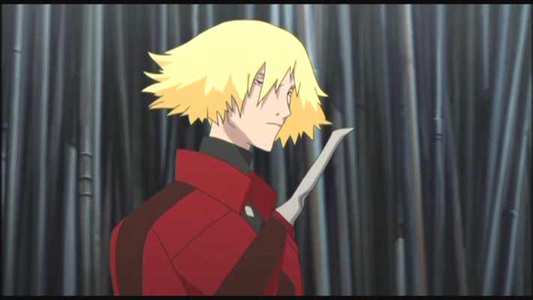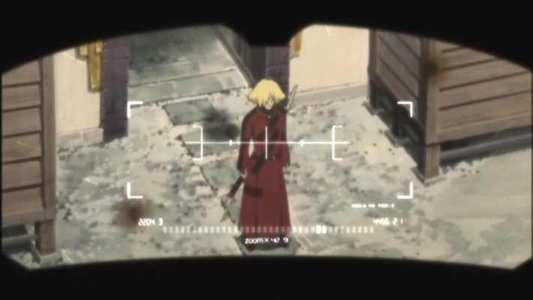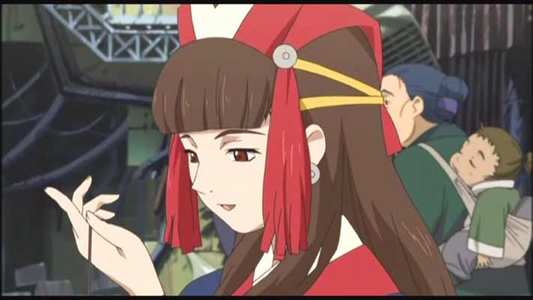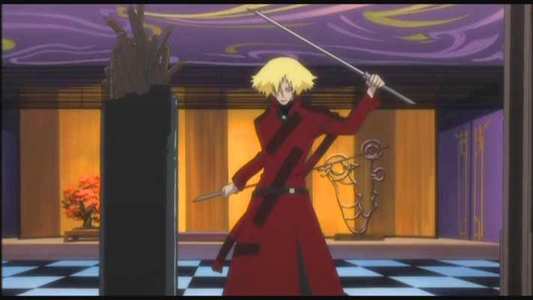Review of Samurai 7: Vol. 1
Introduction
Cross cultural fertilisation! I`m not firing off non-sequiturs for my health, rather I`m commenting on the marvellous phenomenon of inspiration and homage, through which cinema develops and grows. While keeping a genre within one industry soon renders it sterile and stagnant, a foreign perspective can rejuvenate it. The Westerns of John Ford inspired Akira Kurosawa, but what he would do to the genre would give it new lease of life, with Samurai taking the place of gunslingers. His eye for characterisation and fresh direction style in turn inspired a new generation of Westerns in Hollywood, which was turning away from the traditional `good guys versus bad guys` movies. 1960`s Yojimbo begat the Spaghetti Western genre, which is a whole other essay, but it was The Seven Samurai made in 1954 that gave Hollywood its first glimpse of Kurosawa`s genius. This was remade, sans Samurai and avec gunfighters in the classic Magnificent Seven. The idea of seven varied characters as heroes as opposed to the usual one was a thrilling one, and the simple story easily crossed the language barrier. And Hollywood, knowing a good idea when they saw one, did what they always do; they remade it, and remade it. The sequels to Magnificent Seven aside, the Dirty Dozen franchise owed much to the format. Most recently, The Magnificent Seven hit the small screens in a television series, but perhaps the most outlandish take on the story was Battle Beyond The Stars, where a farming planet was terrorised by a devotee to the Star Wars School of big giant spaceships. The planet`s sole boyish hero departed in his suggestively designed ship to gather a fleet of heroes to face the villain, and you`ve guessed it, there were seven in total.
Cross cultural fertilisation strikes again, as Japan`s anime industry turns to Akira Kurosawa`s classic for inspiration, 50 years after the original film made its debut. With the seal of approval from the estate of Kurosawa, and from the eye candy powerhouse that is Gonzo, comes Samurai 7, an animated take on the original story. But this series is set after the second age of the Samurai, in the distant future following a devastating war, where once again a village of farmers has had enough of their hard earned produce going into the bellies of giant cyborg bandits, and have decided to recruit warriors of their own to protect their crops. The first 4 episodes of Samurai 7 are presented on this disc: Search For The Seven. While the English episode titles are given on the menu, the translated Japanese ones are quite different, so for convenience, I`ve used both in my review, English first.
1. The Master/Cut
Marauding cybernetic bandits, hover ominously over a field, calculating just how much rice will be available to them come harvest time. This is more than enough for the hardworking peasants, who at the urging of the village elder decide to hire someone to fight for them. All they can pay is rice, but still farmer Rikichi will go to the city to recruit warriors. At the last minute, the village`s water priestess Kirara joins him, as does her kid sister Komachi. But the city of Kogakyo is a far cry from the humble village of Kanno, and the three soon find themselves out of their depth. Fortunately a valiant young Samurai is at hand when they need one.
2. The Pupil/Eat
Hiring Samurai is harder than they imagined, and although Kirara`s skill at divination points her in the right direction, Kanbe the master Samurai they find is unwilling to help them. Yet she is reluctant to accept the aid of Katsushiro, the young boy who rescued them previously. Offering rice to prospective candidates doesn`t seem to work either, and results only in some well-fed samurai. Kirara`s problems are only beginning, as she has caught the eye of Ukyo, son of the city`s Lord, and he has a tendency not to take no for an answer.
3. The Entertainer/You Must Be Joking
Ukyo is steaming at being thwarted in his plans, and is plotting his revenge. Meanwhile Kanbe is convinced to help Kirara`s village, and begins to look for six other suitable candidates. Katsushiro and the mechanical samurai Kikuchiyo are making their way back when a street entertainer named Gorobe confronts them. When Gorobe challenges Katsushiro to a dangerous wager, it looks like they have the first candidate. The city`s Lord Maro takes the insult to his son personally however, and orders the peasants and Samurai killed.
4. The Loner/Go!
Their dwelling destroyed, our heroes find lodging with Kikuchiyo`s mechanic Masamune, but the search for recruits goes on. Lord Maro is more determined than ever to erase the insult against his authority, and sends his own personal Samurai Kyuzo to deal with the upstarts. Kyuzo proves to be more than a match for Kanbe, but Kanbe sees a recruit that he simply must have.

Video
Samurai 7 gets a colourful and clear transfer from MVM on a dual layer disc. As you would expect from a modern anime, it is a stunning mix of traditional 2D and 3D CG animation. The character designs are excellent, and the world design enchants, a future world that is heavily influenced by the past. The animation is excellent, with the action sequences doing the story justice. There`s even a touch of bullet time thrown into the mix when Gorobe shows up. The only problem was an occasional compression artefact, but this happened rarely.

Audio
You get a choice of DD 5.1 English and Japanese, with translated English subtitles or just a signs track. Both tracks boast great surround presence, although I did feel that the English dub was a little subdued in comparison to the effects and music. The world design is reflected in the sound design, with the future world a curious mix of hi-tech and steam punk. Kikuchiyo, the mechanical Samurai is a good example, with his machinery sounding like a two-stroke engine, punctuated by a steam whistle in times of stress. It`s also curious, that when I hear the theme tunes of a Hollywood or UK production, I usually look for the Chapter Skip, but when I hear an anime theme tune, I wind up looking for the Soundtrack CD. Samurai 7 has another couple of fine tunes for its credit sequences, but the incidental music is more traditional.

Features
A scant scattering of extras graces this disc, beginning with text profiles for four of the characters. You`ll also find a 5-minute promotional video, essentially an extended trailer, the opportunity to see the credit sequences minus the text, as well as trailers for Burst Angel and the striking Tenjho Tenge. All this is packaged in an Amaray style case with some stunning moody artwork. Oddly, there are no English language credit sequences for any of the episodes, so IMDB is your first port of call for the actors` names.

Conclusion
Do we really need another version of The Seven Samurai? Not particularly, but it doesn`t hurt either. You can tell that despite the gorgeous eye-candy and consistently exciting action set pieces, I`m somewhat ambivalent about this future reimagining of the classic movie. The problem is that it is both too short and too long. The original film comes to around 190 minutes, which equates to approximately 8 of these anime length episodes. Filling a series runtime of 26 episodes means that there is some serious filler to the story. On this first disc we get the new character of Kirara the water priestess, who provides a potential love interest for the wet behind the ears Katsushiro. It also means we get the corrupt Ukyo fixating on her and allowing for more than one diversion while they are in the city. I get the feeling that the rest of the series will also have additional subplots in this manner to bolster the main story.
But the episodes, or rather the first episode in particular is too short. The first episode has to sell the premise, introduce the main characters and the world they inhabit as well as the overall story in the first twenty minutes. Something had to give, and in this case it is the villains of the piece. All we see of the bandits is a gargantuan hovering form, cruising ominously over a rice field. There is no personality to them, no sense of immediate threat. At no point do they actually threaten the peasants, and we have to go by the farmers` accounts that these are a menace to be dealt with. The first episode would have been better at twice the length and not so frantically paced. But once we get to the city, everything slows down. Kirara and her companions are introduced to this complicated world at the end of the first episode, as she sees three of the warriors straight off when her rice is stolen, and when there is a confrontation in a shop. But the subsequent episodes are almost languid in comparison, as we go about the business of finding the seven warriors that will protect her village. I get the feeling that it won`t be until episode eight that we will meet them all, as by the end of this first disc, we have barely got halfway through the recruitment process.
The world of Samurai 7 is an appealing one, with its curious blending of future and past. The society of the original Samurai has been transplanted almost unaltered to the future, with the warriors falling into poverty and disrepute following the end of the last war, the greedy merchants taking advantage of this, and ruling through wealth rather than power, while the poor peasantry takes abuse from both sides. These futuristic Samurai may still carry swords, but many are now cyborgs and robots, and their skills with the sword have grown to match this new world. The warriors that we do meet are interesting characters, Kanbe is the leader of the group, but he was on the losing side of the war and because of that is reluctant to jinx the undertaking this time. Katsushiro is the young Samurai in training, earnest and heartfelt and eager to help. Kikuchiyo is a Porthos like robot, whose first impulse is to use brawn in any situation, usually resulting in mayhem and destruction, and necessitating repairs to his body. Gorobe is the entertainer who seems intent on testing himself, looking on any opportunity to face death as a challenge to be accepted. We get a glimpse of Kyuzo by the end of the disc, and he looks to be the sort of master swordsman who has nothing left to prove, but of course he hasn`t been recruited yet.
I enjoyed Samurai 7, but I`m hard pressed to really enthuse about it. Perhaps it`s that the original story has been given a futuristic coat of paint, but doesn`t really make enough of the futuristic setting, instead relying more on the societal divisions and mores of the past. I must admit that I enjoyed seeing classic moments from the film recreated here, and the characters look to be an interesting bunch. I can`t help but feel that the story is tenuous and padded out in a full-length series, and waiting for the seven to come together over these first two discs is like waiting for an overture to end. It is enjoyable, but I keep wondering when the real fun will start. Maybe comparing it to the original film or even The Magnificent Seven is unfair, but unless Samurai 7 can introduce more originality and differentiate itself from its illustrious forebear, then it could wind up a mediocre rehash. The first volume of Samurai 7 fittingly gets a 7 in my estimation; it`s a promising beginning, but needs to do better.
Your Opinions and Comments
Be the first to post a comment!